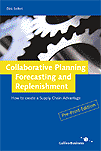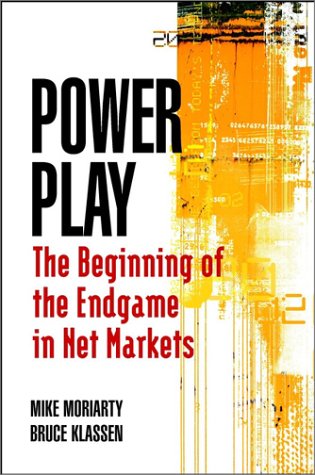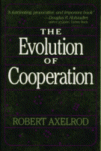My Top Books
Here are my overviews of some of my more recently read or favorite books, and some that were previously on my "favorites" list. I also add comments when I can be motivated to.
Peer to Peer
![]()

Peer-to-Peer: Collaboration and Sharing over the Internet, by Bo Leuf. After reading the Barkai book, this was not as good. Lots of technical details of some fewer vendors, and a lot less of how P2P will impact business. Some hints, but less actual suggestions or examples. 6/10

Peer-to-Peer Computing: Technologies for Sharing and Collaborating on the Net, by David Barkai, Intel. The best P2P book I have read so far and though I have 5 under my belt I have another 5 to go! Burkai includes a history, and very much update exposition on what defines P2P. He even goes as far as I did back in 2000 with "shared content, shred resources, and shared processes" which is the most leading edge thinking here as it opens up access to B2B. Detailed review of vendors are included those these change so fast and are not as useful as the amount of coverage might suggest. Overall a good read - one to lead with. 8-10.

P2P: How Peer-to-Peer Technology is Revolutionizing the way we do business, by Hassan Fattah, Dearborn, 2002. 7/10 great book that repeats all that P2P stuff that is "real P2P, Napster and beyond" though it is a tad short of examples of how P2P really might change the way we do business. P2P is described has having 4 themes; user collaboration, application integration, resources allocation, and supercomputing. In fat the latter two are really two aspects of the same thing (applications or use of spare CPU or storage space), and application integration is really boring and already handled with Web Services. What really defines P2P as "new" and highly disruptive is in the collaboration area, and how "process symmetry" will emerge as huge benefactors for P2P. But this book is very short of this and does little more than talk about how IM and how it might change things. Good book, but lacking in the one area that will make P2P critical in the future. 7/10

Irresistible Forces: the business legacy of Napster by Trevor Merridan: 6/10 good early review of P2P and B2B though still falls short.

Peer-to-Peer : Harnessing the
Power of Disruptive Technologies
Professional
Emergence: The Connected lives of Ants, Brains, Cities and Software, by Steven Johnson, 2001.

A delightful must-have! If you are into:
complexity theory,
self organizing systems, or
massively distributed systems versus centralized,
(any everyone who is in the supply chain is, and probably does not know it) then this book is a lovely, fresh, easy to read overview of how all these ideas come together.
Or if you like PC games SimCity more than Civilization, or Black and White more than Sacrifice, then you are into Emergence and never even knew it!
How is it that ants, who have command organization, can persist and "learn" from generation to generation? Local rules lead to global structures - but a structure that you wouldn't necessarily predict from the rules. New ideas seem to suggest that ants have a low level, local rules that, taken on a massive scale, can be used to manage a huge organization. This book takes weaves a lovely spell through DNA, how cities (self) evolve, through to how the cosmos operates. And then you have to stop and think about the value chain: it is self-organizing; it persists; it "learns" even when agents come and go (read go bust or form) and so on.... Get my drift? 10 out of 10!

Collaborative Planning Forecasting and Replenishment, see write up here. 7/10.


Power Play - The Beginning of the Endgame in Net Markets, by A.T.Kearney consultants Mike Moriarty and Bruce Klassen. This is my Amazon review: I sought this book, so excited! With "dating game" and "P2P" in the contents, I was convinced this would be "the one" that would step outside the mold and challenge the future of B2B. But alas I was disappointed. The book is reasonable, but full of inconsistencies. It harps on about the true value of new business processes, and yet all the "hard examples and research" focus on RPF processes, how Ariba and Commerce One and i2 would take over the world. Look what happened to Ariba and C1! E-Procurement is the LOW HANGING FRUIT GUYS. The book suggests that centralizing net markets will dominate the planet, but neatly ignores that fact the e-business leaders are not collaborating for mutual gain (the government would have for you for that) but they are colluding! They talk about "value chains" as one big happy family and that "competitive practices" are being re-written - then fail to explain what that means. I would stick with the B2b books by Sculley and Woods for now; until a real forward looking book gets out. A.T. Kearney needs to look beyond the lovey-dovey hand shakes of the WWRE and ask what those companies are really doing on their private extranets! This is like the Cold War – where there are visible moves and invisible modes; and the real war is yet to be played out; and it will not be played on the visible stage! 0 out of 10 - DON'T BOTH WITH THIS BOOK

The Ultimate Game of Strategy, by Peter Small, FT.com, 2001. 5 out of 10. Reasonable "lite" book that never really gets to fire on all cylinders. Supposed to focus on personal connectedness for e-Business leaders, but wanders all over the map to try to make the points. Good light-weight book that covers many interesting themes easily enough for most readers. If you are not into heavy e-Business, and like game theory, Darwin, and so on, this would be a nice "train ride' book.

Evolving E-markets: Building High Value B2B Exchanges with Staying Power, by William Woods, Arthur Sculley, et al. I would give this a book 2/10 as it relates to the title of the book, and 9/10 as it relates to the subject that is actually covered. This book does a great job of describing what you need to know in you wanted to build out a public trading exchange; but it does little to describe the actual evolution of e-Markets. It does not respect private net markets, not does it even "discover" the aspect of P2P and network interoperability. Woods and Scully had previously published a book called "B2B Exchanges: The Killer Application in the Business-to-Business Internet Revolution last year and it too focused only on the public aspects of B2B exchange. The best written materials on the actual evolution of course all that I have written, and much of what Deloitte Consulting has written and especially their paper, "Going Private to get Results". 2 out of 10.

The Innovator's Dilemma: When new technologies cause great firms to fail, by Clayton Christensen, Harvard Business School Press, 1997. 9 out of 10.

Blown to Bits: How the new economics of information transforms strategy, by Philip Evans and Thomas s. Wurster, Harvard Business School Press, 2000. 8 out of 10.
B2B Exchanges: The Killer Application in the B2B Internet Revolution, by Arthur Sculley and W.William a. Woods, ISI Publications, 1999. 2 out of 10.
Personal

The Riddled Chain, by Jeffrey Kevin KcKee. How chaos theory and a little bit of luck make natural selection work; how DNA enforces errors to occur enough that "good" errors ensure evolution takes place.

Here are some quotes from the Mating Mind: "Sexual selection usually behaves like an insanely greedy tabloid newspaper editor who deletes all news and leaves only advertisements. In human evolution, it is as if the editor suddenly recognized a niche market for news in a few big-brained readers. She told all her reporters she wanted wall-to-wall news, but she never bothered to set up a fact-checking department. Human ideology is the result."
"...many games demand mixed strategies, and many evolutionary situations demand unpredictable behavior."
"Normally, sexual selection makes males better display-producers and females better display-discriminators."
"Animals have been playing God ever since they first evolved powers of sexual choice. Finding mates with good genes is one of the major functions of mate choice."
"Mate choice is intrinsically discriminatory and judgmental, built to rank potential mates by reducing their rich subjectivity to a crass list of physical, mental, and social features. It scrutinizes individuals for infinitesimally harmful mutations and trivial biological errors, anxiously anticipating any heritable weakness that natural selection would have spurned in the Pleistocene. It discounts everything that humans have in common, focusing only on differences. And it pays the most attention to the fitness indicators that amplify those differences to the greatest extent. When we are actually choosing long-term sexual partners, there may be good reasons to listen to our mate choice circuits. The better we understand our mate choice instincts, the easier they may be to override when they are socially inappropriate. There is much more to modern human social life than courtship, and much more to people than their fitness indicators."
![]()

The Evolution of Cooperation, by Robert Axelrod, Basic Books, Perseus Books Group, 1984.
Turtles, Termites, and Traffic Jams: Explorations in Massively Parallel Mircroworlds, by Mitchel Resnick, Bradford Books, MIT Press, 1997; wonderful examples of how groups self-organize; use as a prelude to thinking about how buyers and sellers congregate in groups and defuse between groups; understand how markets can self-organize.


River out of Eden, by Richard Dawkins. Review of evolutionary biology; arguments for how complex beings and things evolve when some would say, "it it so rare and complex, there is no way you can use 'half an eye'". Also, did you know that bees tell the time? Not according to a 12 or 24 hour watch, but they can tell time. Read on maestro! Here are some interesting quotes from the book:
"Genes do not improve in the using. they are just passed on, unchanged except for very rare random errors. It is not success that makes good genes. It is good genes that makes success, and nothing an individual does during its lifetime has any effect whatever upon its genes."
"Paternal genes and maternal genes do not blend; they recombine independently."
"To survive in the long run a gene must be a good companion."
"There are now perhaps thirty million branches to the river of DNA, for that is an estimate of the number of species on earth. It has also been estimated that the surviving species constitute about 1 percent of the species that have ever lived."
"We - and that means all living things - are survival machines programmed to propagate the digital database that did the programming."
"Darwinism works only because - apart from discrete mutations, which natural selection either weeds out or preserves - the copying process is perfect."
"Nature is not cruel, it is pitilessly indifferent."
"We humans have purpose on the brain. We find it hard to look at anything without wondering what it is "for," what the motive is, or the purpose behind it."
Take a party scenario where everyone is talking at the same time, trying to be heard. Why is it that the party always gets louder and louder? Why don't people cooperate and talk in whispers so that more can be heard? Look at this:
"Time and again, cooperative restraint is thwarted by its own internal instability. God's Utility Function seldom turns out to be the greatest good for the greatest number. God's Utility Function betrays its origins in an uncoordinated scramble for selfish gain."
"Nature's Utility Function never values longevity for its own sake but only for the sake of future reproduction." Why is it that one species of salmon return to spawn and die, and another will repeat the cycle (to their original birth place) twice? How can nature justify the energy diversion?
And my favorite, "..we inherit what it takes to be young, but not necessarily what it takes to be old."